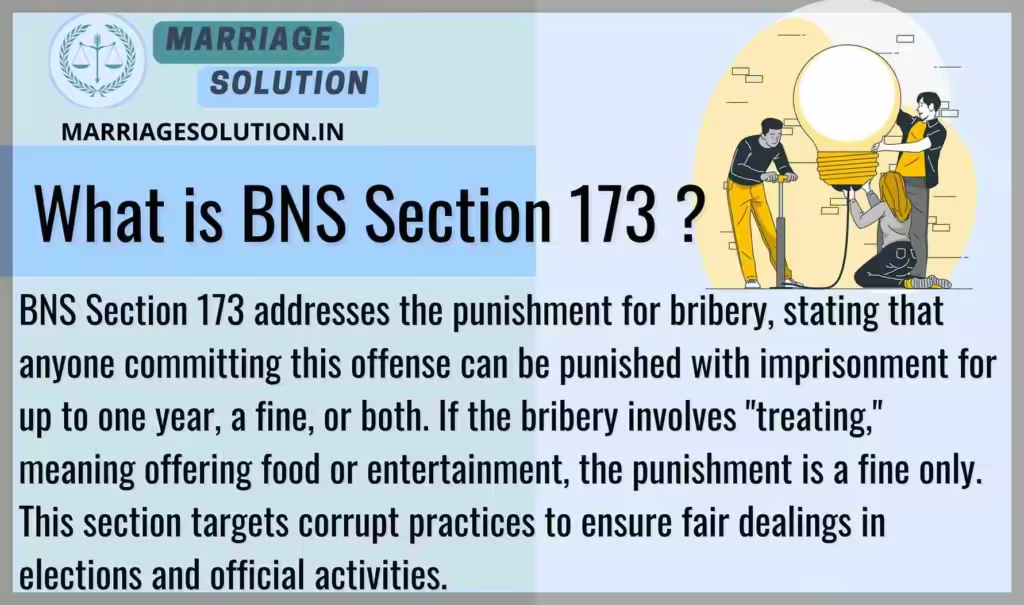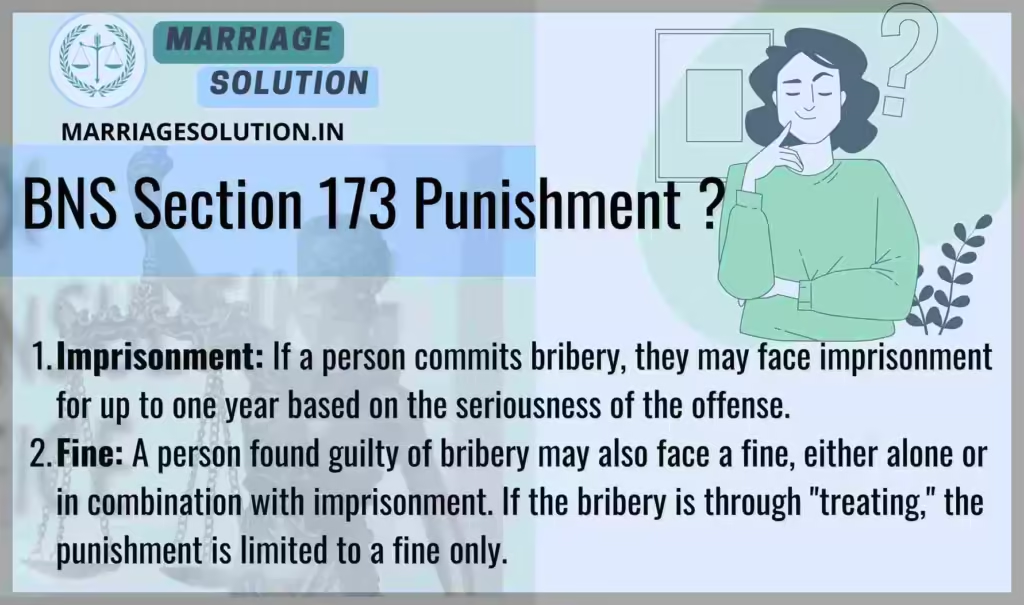Introduction of Section 173 BNS
Bribery is one of the most common corrupt practices that threatens the fairness of elections and official processes. Section 173 of the Bharatiya Nyaya Sanhita (BNS), 2023, deals with the punishment for bribery. It states that anyone found guilty of giving or accepting bribes can face imprisonment for up to one year, a fine, or both. However, when bribery takes the form of “treating”—that is, offering food, drink, or entertainment—the punishment is limited to a fine only. This provision ensures that electoral integrity is preserved while recognizing different levels of seriousness in bribery offences.
The Bharatiya Nyaya Sanhita (BNS) Section 173 replaces the old Indian Penal Code (IPC) Section 171-E.
What is BNS Section 173 ?
BNS Section 173 addresses the punishment for bribery, stating that anyone committing this offense can be punished with imprisonment for up to one year, a fine, or both. If the bribery involves “treating,” meaning offering food or entertainment, the punishment is a fine only. This section targets corrupt practices to ensure fair dealings in elections and official activities.

BNS 173 Bribery
Whoever commits the offence of bribery shall be punished with imprisonment of either description for a term which may extend to one year, or with fine, or with both.
Provided that bribery by treating shall be punished with fine only.
Explanation of Section 173
BNS Section 173 prescribes the punishment for bribery. It applies to both the giver and the receiver of bribes in elections and official contexts. The law differentiates between ordinary bribery (money, gifts, favors) and “treating” (food, drink, entertainment), prescribing stricter punishment for the former and lighter punishment for the latter.
- Bribery Defined → Offering or accepting money, gifts, or favors to influence decisions, especially during elections.
- Treating Defined → A form of bribery involving hospitality (food, drinks, entertainment).
- Punishment for Bribery → Jail up to 1 year, fine, or both.
- Punishment for Treating → Fine only, no imprisonment.
- Objective → To stop corrupt practices, particularly in elections, and safeguard fairness.
Offence Classification under BNS Section 173
- Cognizability → Non-cognizable (police require court’s permission to arrest).
- Bailable? → Bailable offence.
- Compoundable? → Non-compoundable (cannot be privately settled).
- Trial Court → Triable by a Magistrate of the First Class.
Key Elements of Section 173
- Covers All Bribery → Punishes both giver and receiver of bribes.
- Differentiates Treating → Hospitality as bribery gets only a fine.
- Punishment → Imprisonment up to 1 year, or fine, or both.
- Fine-Only for Treating → No jail term for food/entertainment bribery.
- Non-cognizable → Requires court permission for police action.
- Bailable → Bail available to the accused.
- Non-compoundable → Case cannot be withdrawn by private settlement.
- Magistrate Trial → Magistrate of the First Class conducts trial.
- Election Focus → Designed to ensure fairness in electoral processes.
- Corruption Deterrent → Aims to discourage bribery as a political tool.
Examples of BNS Section 173
Example 1 – Cash Bribe:
A candidate offers ₹20,000 to voters in exchange for votes. This is bribery punishable under Section 173 with imprisonment up to 1 year, a fine, or both.
Example 2 – Treating as Bribery:
During an election rally, a candidate organizes a lavish feast and free drinks for voters. Since this falls under “treating,” the punishment will be fine only.
Why Section 173 is Important
- Protects Elections → Ensures fairness by punishing bribery in voting.
- Prevents Misuse of Hospitality → Recognizes food/drink bribery but punishes it lightly.
- Discourages Corruption → Clear penalties for anyone attempting to buy influence.
- Modernizes Old IPC Provision → Updates bribery laws for today’s context.
- Safeguards Democracy → Keeps elections transparent and free from corrupt practices.
Section 173 BNS Overview
BNS Section 173 deals with the punishment for bribery. It says that anyone guilty of bribery can face up to one year in jail, a fine, or both. If the bribery involves offering food or entertainment, the punishment is just a fine. This section aims to stop corruption and ensure fairness in elections and official work.
BNS 173 :10 Key Points
1. Bribery
Bribery means offering someone something valuable, like money, gifts, or favors, to get them to do something illegal or dishonest. It is commonly used to influence someone’s decision, especially in elections or government jobs. This section makes it clear that bribery is illegal.
2. Punishment for Bribery
If someone is caught giving or accepting a bribe, they can be punished by being sent to jail for up to 1 year. This is meant to be a strong deterrent to stop people from trying to buy or sell influence.
3. Fine for Bribery
In addition to or instead of jail time, a person found guilty of bribery may have to pay a fine. The court will decide how much the fine will be based on the seriousness of the bribery.
4. “Treating” Defined
The section explains a special type of bribery called “treating”. This happens when someone offers food, drink, entertainment, or other hospitality to get someone to do something wrong. It’s considered a form of bribery, but the punishment for it is different.
5. Punishment for “Treating”
If someone is guilty of bribery by “treating,” they won’t go to jail. Instead, they will only have to pay a fine. This is because offering food or entertainment is seen as a lighter form of bribery compared to giving money.
6. Non-Cognizable Offense
Bribery under Section 173 is a non-cognizable offense. This means the police cannot arrest someone for bribery without a court’s permission. A warrant is required to make an arrest, which offers some protection to the accused.
7. Bailable Offense
Bribery is a bailable offense under this section. This means that if someone is arrested for bribery, they can apply for bail and be released while their case is being processed in court. They don’t have to stay in jail during the trial unless the court decides otherwise.
8. Tried by Magistrate of First Class
Cases of bribery under this section are handled by a Magistrate of the First Class. This is a type of judge who deals with less serious offenses. The magistrate has the authority to conduct the trial, hear the evidence, and give the final judgment.
9. Non-Compoundable Offense
Bribery under BNS Section 173 is a non-compoundable offense. This means that once the case is filed, it cannot be settled out of court or withdrawn by the parties involved. The case must be decided by the court, even if the victim and the accused want to come to a private agreement.
10. Purpose of the Law
The main goal of Section 173 is to stop corruption, especially during elections. It aims to ensure that people do not offer or accept bribes to influence voting or other important decisions. The section provides clear punishments to discourage people from engaging in bribery.
Examples of BNS Section 173
- Example 1: Offering Money A person offers ₹50,000 to a government official in exchange for approving a construction project without following the necessary legal procedures. This action constitutes bribery, and if caught, the person could be sentenced to imprisonment for up to one year, a fine, or both.
- Example 2: Treating as Bribery During an election campaign, a candidate organizes a lavish party and provides free food and drinks to voters to influence their decision at the polls. Since this is considered “treating,” if the candidate is found guilty, they will only be fined, with no imprisonment.
BNS 173 Punishment
- Imprisonment
If a person commits bribery, they may face imprisonment for up to one year based on the seriousness of the offense. - Fine
A person found guilty of bribery may also face a fine, either alone or in combination with imprisonment. If the bribery is through “treating,” the punishment is limited to a fine only.

BNS 173 bailable or not ?
Yes, BNS Section 173 is a bailable offense. This means that a person arrested under this section has the right to apply for bail, and if granted, can be released from custody pending trial.
Comparison Table – BNS Section 173 vs IPC (Old Law – Section 171E & 171F)
| Section | What it Means | Punishment | Bail | Cognizable? | Trial By |
|---|---|---|---|---|---|
| BNS Section 173 | Deals with punishment for bribery — offering or accepting money, gifts, or favors to influence electoral decisions. Covers both giver and receiver. |
Imprisonment up to 1 year, or fine, or both. If bribery involves “treating” (food, drink, or entertainment) — fine only. |
Bailable (accused can seek bail) | Non-Cognizable (requires court permission to arrest) | Magistrate of the First Class |
| IPC Sections 171E & 171F (Old) |
Earlier provisions punishing bribery and undue influence during elections. 171E – Bribery; 171F – Undue influence or personation. |
171E – Up to 1 year imprisonment, or fine, or both; treating fined only. 171F – Up to 1 year imprisonment, or fine, or both. |
Bailable | Non-Cognizable | Magistrate of the First Class |
BNS Section 173 FAQs
What does BNS Section 173 cover?
It covers the punishment for bribery, including giving or accepting money or gifts to influence someone.
What is the punishment for bribery?
The punishment can be up to 1 year of imprisonment, a fine, or both. For “treating,” only a fine is imposed.
Is BNS Section 173 bailable?
Yes, offenses under Section 173 are bailable.
Who handles cases under Section 173?
Cases are tried by a Magistrate of the First Class.
Can bribery cases be settled privately?
No, bribery under this section is non-compoundable, meaning it cannot be withdrawn or settled between parties.
Conclusion
BNS Section 173 strengthens India’s fight against corruption by laying down clear punishments for bribery in elections. By punishing both the giver and receiver, it ensures that attempts to influence voters through money, gifts, or favors are discouraged. At the same time, it distinguishes “treating” as a lesser form of bribery, prescribing only a fine. By consolidating provisions from IPC Sections 171E and 171F, the BNS simplifies the law, making it clearer and easier to enforce. This section plays a vital role in ensuring fair, transparent, and corruption-free elections in India.
Need Legal Support?
If you’re facing court proceedings, marriage-related issues, or any legal matter, our team at Marriage Solution – Lawyer Help is ready to guide you. Just complete our easy online enquiry form, and we’ll connect you with the right legal assistance tailored to your needs. helpful. By completing our enquiry form and submitting it online, we can provide customized guidance to navigate through the process.
Finished with BNS 173 ? Continue exploring the next provisions of the Bharatiya Nyaya Sanhita (BNS), 2023. Each section includes explanations, examples, and plain-language breakdowns for easy understanding.
- BNS 174 :Punishment for undue influence or personation at an election.
- https://marriagesolution.in/bns_section/bns-174/
- BNS 175 : False statement in connection with an election.
- https://marriagesolution.in/bns_section/bns-175/
- BNS 176 : Illegal payments in connection with an election.
- https://marriagesolution.in/bns_section/bns-176/
- BNS 177 : Failure to keep election accounts.
- https://marriagesolution.in/bns_section/bns-177/
Chapter X – Of Offences Relating To Coin, Currency Notes, Bank Notes, And Government Stamps
- BNS 178 : Counterfeiting coin, government stamps, currency-notes or bank-notes.
- https://marriagesolution.in/bns_section/bns-178/
Full IPC Section List: https://marriagesolution.in/ipc-section-list
All Indian Law & Blogs: https://marriagesolution.in/indian-law/
Full BNSS Section List: https://marriagesolution.in/bnss_section-list
